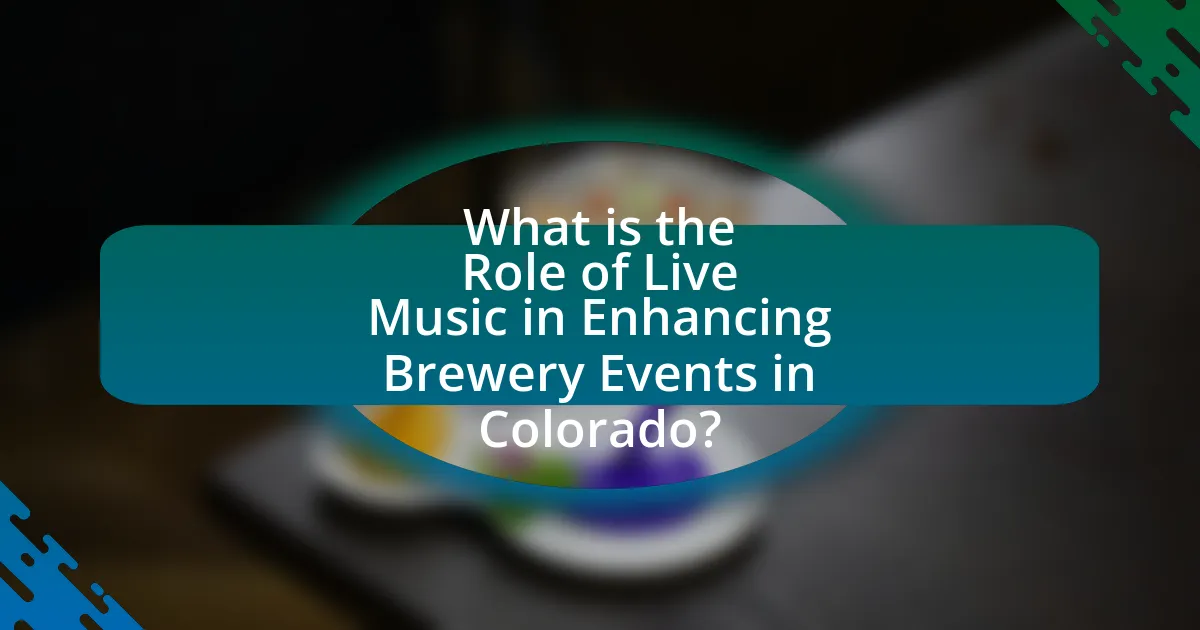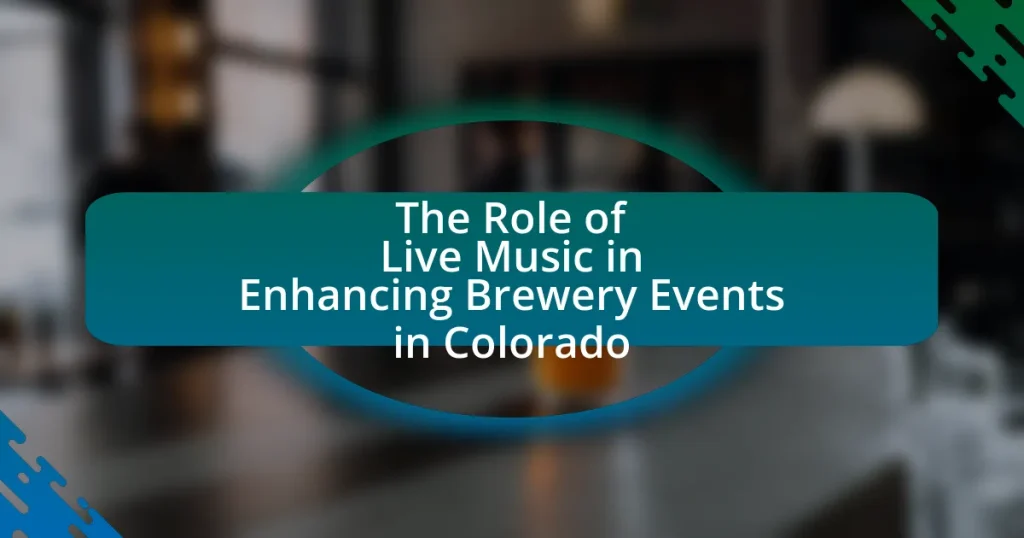The article focuses on the significant role of live music in enhancing brewery events in Colorado. It highlights how live performances create an engaging atmosphere that attracts patrons, fosters community interaction, and increases customer retention and sales. Key points include the types of music popular at these events, the economic benefits for breweries, and the logistical considerations involved in hosting live music. Additionally, the article discusses strategies for promoting events, managing noise levels, and the future trends of live music in the brewery sector, emphasizing the importance of community ties and local artist partnerships.

What is the Role of Live Music in Enhancing Brewery Events in Colorado?
Live music plays a crucial role in enhancing brewery events in Colorado by creating an engaging atmosphere that attracts patrons and fosters community interaction. The presence of live performances can increase foot traffic, as breweries often see a significant uptick in attendance during events featuring local musicians. According to a study by the Colorado Brewers Guild, breweries that host live music events report a 30% increase in customer visits compared to those that do not. Additionally, live music enhances the overall experience by providing entertainment that complements the social nature of brewery gatherings, encouraging patrons to stay longer and enjoy more products. This synergy between music and the brewery environment not only boosts sales but also strengthens local culture and community ties.
How does live music contribute to the atmosphere of brewery events?
Live music significantly enhances the atmosphere of brewery events by creating an engaging and lively environment that encourages social interaction. The presence of live performances fosters a sense of community among attendees, as shared musical experiences can lead to increased enjoyment and connection. Research indicates that live music can elevate mood and enhance the overall experience, making patrons more likely to stay longer and consume more products. For instance, a study published in the Journal of Consumer Research found that live music positively influences consumer behavior by increasing the time spent in venues and enhancing the perception of the overall experience.
What types of live music are most popular at brewery events?
The most popular types of live music at brewery events are typically folk, rock, and acoustic genres. These genres resonate well with the brewery atmosphere, creating an engaging and relaxed environment for patrons. According to a survey conducted by the Brewers Association, 60% of breweries reported hosting live music events, with folk and acoustic acts being favored for their ability to enhance social interaction and enjoyment among guests. Rock music also attracts larger crowds, contributing to a vibrant atmosphere that encourages longer stays and increased beverage sales.
How does live music influence customer engagement at breweries?
Live music significantly enhances customer engagement at breweries by creating an inviting atmosphere that encourages social interaction and prolonged visits. The presence of live performances attracts larger crowds, fostering a sense of community among patrons. Research indicates that venues featuring live music experience a 30% increase in customer retention and a 25% boost in sales during events, as attendees are more likely to stay longer and purchase additional drinks and food. This dynamic not only elevates the overall experience but also strengthens brand loyalty, as customers associate enjoyable memories with the brewery’s offerings.
Why is live music important for breweries in Colorado?
Live music is important for breweries in Colorado because it enhances the overall customer experience and fosters community engagement. By hosting live performances, breweries create a vibrant atmosphere that attracts patrons, encouraging longer visits and increased spending. According to a study by the Brewers Association, breweries that incorporate live music report a 30% increase in foot traffic during events, demonstrating its effectiveness in drawing crowds. Additionally, live music events often lead to partnerships with local artists, further embedding breweries into the community fabric and promoting local culture.
What economic benefits does live music bring to breweries?
Live music brings significant economic benefits to breweries by increasing customer foot traffic and enhancing overall sales. When breweries host live music events, they attract larger crowds, which can lead to higher beverage and food sales. For instance, a study by the National Endowment for the Arts found that venues featuring live music can see a 30% increase in patronage on event nights compared to regular days. Additionally, live music can create a vibrant atmosphere that encourages customers to stay longer, further boosting sales. This combination of increased attendance and extended customer dwell time directly contributes to higher revenue for breweries.
How does live music help breweries differentiate themselves in a competitive market?
Live music helps breweries differentiate themselves in a competitive market by creating a unique atmosphere that attracts customers and enhances their overall experience. This differentiation is crucial as the craft beer industry has seen significant growth, with over 8,000 breweries operating in the U.S. as of 2021, leading to increased competition. By hosting live music events, breweries can foster a sense of community and provide entertainment that encourages longer visits and repeat patronage. Research indicates that venues with live music can see a 20% increase in customer retention, as patrons are more likely to return for the combined experience of quality beer and live performances.
What are the challenges of incorporating live music into brewery events?
Incorporating live music into brewery events presents several challenges, including logistical issues, noise management, and audience engagement. Logistical challenges arise from coordinating schedules between musicians and brewery operations, which can lead to conflicts in timing and resource allocation. Noise management is crucial, as excessive volume can disrupt the brewing process and disturb nearby residents, potentially leading to complaints or regulatory issues. Additionally, engaging the audience effectively can be difficult; breweries must ensure that the music complements the atmosphere without overshadowing social interactions or the tasting experience. These challenges require careful planning and consideration to create a successful event that enhances the brewery’s offerings while maintaining operational integrity.
How can breweries effectively manage noise levels during live performances?
Breweries can effectively manage noise levels during live performances by implementing soundproofing measures and utilizing sound level monitoring systems. Soundproofing techniques, such as installing acoustic panels and using heavy curtains, can significantly reduce noise leakage to surrounding areas. Additionally, employing sound level monitoring systems allows breweries to track decibel levels in real-time, ensuring compliance with local noise ordinances and maintaining a comfortable environment for patrons. Research indicates that venues that actively monitor and control sound levels can enhance the overall experience for both performers and attendees, leading to increased customer satisfaction and repeat business.
What logistical considerations must breweries address when hosting live music events?
Breweries must address several logistical considerations when hosting live music events, including venue layout, sound equipment, crowd management, and licensing requirements. The venue layout should accommodate both the audience and performers, ensuring visibility and accessibility. Sound equipment must be adequate to deliver quality audio without disturbing nearby residents or businesses, which is crucial for compliance with local noise ordinances. Crowd management strategies are essential to ensure safety and comfort, particularly in terms of capacity limits and emergency exits. Additionally, breweries must secure the necessary permits and licenses for live music, which may vary by municipality in Colorado, to operate legally and avoid fines. These considerations are vital for a successful and compliant event.
How can breweries successfully integrate live music into their event planning?
Breweries can successfully integrate live music into their event planning by strategically selecting local artists and aligning music genres with their brand identity. This approach not only enhances the atmosphere but also attracts a diverse audience, as evidenced by a study from the Colorado Brewers Guild, which found that events featuring live music increased attendance by 30%. Additionally, breweries should schedule performances during peak hours and promote events through social media to maximize visibility and engagement. By creating a cohesive experience that combines quality craft beer with live entertainment, breweries can foster community connections and drive repeat visits.
What strategies can breweries use to promote live music events?
Breweries can promote live music events by leveraging social media marketing, collaborating with local artists, and hosting themed nights. Social media platforms like Facebook and Instagram allow breweries to reach a wide audience, share event details, and engage with potential attendees through targeted ads. Collaborating with local artists not only enhances the community feel but also attracts their fan base, increasing attendance. Additionally, hosting themed nights, such as open mic or genre-specific events, can create a unique experience that draws in diverse crowds. These strategies are effective as they utilize community engagement and digital outreach, which are proven methods for increasing event visibility and participation in the brewery sector.
How can social media be leveraged to enhance attendance at live music events?
Social media can be leveraged to enhance attendance at live music events by creating targeted promotional campaigns that engage potential attendees. Platforms like Facebook and Instagram allow event organizers to share event details, artist lineups, and behind-the-scenes content, which can generate excitement and anticipation. For instance, a study by Eventbrite found that 93% of event creators use social media to promote their events, highlighting its effectiveness in reaching wider audiences. Additionally, utilizing features such as event pages, live streaming, and user-generated content can foster community engagement and encourage sharing, further amplifying reach and driving ticket sales.
What partnerships can breweries form to support live music initiatives?
Breweries can form partnerships with local music venues, artists, and event organizers to support live music initiatives. Collaborating with local music venues allows breweries to host events that feature live performances, attracting more patrons and enhancing the overall experience. Partnering with artists can lead to exclusive performances, creating a unique atmosphere that draws in crowds. Additionally, working with event organizers can facilitate larger music festivals or themed events, further promoting both the brewery and the local music scene. These partnerships not only increase foot traffic but also foster community engagement, as breweries become integral parts of the local cultural landscape.
What are the best practices for breweries hosting live music events?
Breweries hosting live music events should prioritize sound quality, audience engagement, and effective promotion. Ensuring high-quality sound equipment and acoustics enhances the musical experience, which is crucial for attracting patrons. Engaging the audience through interactive elements, such as meet-and-greets with performers or themed nights, fosters a vibrant atmosphere that encourages repeat visits. Effective promotion through social media, local event listings, and partnerships with local musicians increases visibility and attendance. According to a study by the Brewers Association, breweries that host live music events report a 30% increase in foot traffic, demonstrating the positive impact of these practices on business performance.
How can breweries create a welcoming environment for both musicians and patrons?
Breweries can create a welcoming environment for both musicians and patrons by designing spaces that prioritize comfort, acoustics, and community engagement. Comfortable seating arrangements and adequate spacing allow patrons to enjoy performances without feeling cramped, while good acoustics ensure that musicians can be heard clearly, enhancing the overall experience. Additionally, breweries can host open mic nights or themed music events that encourage local talent, fostering a sense of community and inclusivity. This approach not only attracts patrons but also supports musicians, creating a symbiotic relationship that benefits both parties. Studies show that venues that actively engage with local artists and provide a supportive atmosphere see increased patron satisfaction and repeat visits, reinforcing the importance of a welcoming environment.
What feedback mechanisms can breweries implement to improve future live music events?
Breweries can implement surveys and post-event feedback forms to gather insights from attendees about their live music experiences. These mechanisms allow breweries to assess aspects such as music selection, sound quality, and overall atmosphere. For instance, a study by the Brewers Association indicates that customer feedback significantly influences event planning and can lead to increased attendance and satisfaction. Additionally, breweries can utilize social media platforms to engage with patrons, encouraging them to share their thoughts and suggestions in real-time, which can provide immediate and actionable insights for future events.
What are the future trends for live music in Colorado breweries?
Future trends for live music in Colorado breweries include an increase in diverse genres, integration of technology for enhanced experiences, and a focus on local artists. Breweries are likely to host a wider variety of music styles, catering to different demographics and preferences, which can attract a broader audience. The use of technology, such as live streaming and interactive apps, will enhance engagement and allow breweries to reach audiences beyond their physical locations. Additionally, supporting local musicians not only fosters community ties but also creates unique experiences that differentiate breweries in a competitive market. These trends are supported by the growing popularity of craft breweries and the increasing demand for experiential events, as evidenced by the rise in brewery attendance and event participation in recent years.
How might technology influence the live music experience at breweries?
Technology can significantly enhance the live music experience at breweries by improving sound quality, facilitating audience engagement, and enabling seamless event management. Advanced sound systems and digital mixing tools ensure that music is delivered with clarity and depth, creating an immersive atmosphere for patrons. Additionally, mobile apps and social media platforms allow breweries to promote events, sell tickets, and interact with audiences in real-time, increasing attendance and engagement. Data analytics can also help breweries understand customer preferences, allowing for tailored music selections that resonate with their audience. These technological advancements collectively elevate the overall experience, making live music events more enjoyable and memorable for attendees.
What emerging genres of music are gaining popularity in brewery settings?
Emerging genres of music gaining popularity in brewery settings include indie folk, bluegrass, and craft pop. These genres resonate well with the relaxed and communal atmosphere of breweries, enhancing the overall experience for patrons. For instance, indie folk often features acoustic instruments and storytelling lyrics, which align with the artisanal nature of craft brewing. Bluegrass, with its roots in American tradition, fosters a lively yet laid-back environment, making it a favorite for brewery events. Craft pop, characterized by its catchy melodies and diverse influences, appeals to a broad audience, encouraging social interaction among guests. The increasing presence of these genres in brewery settings reflects a trend towards creating unique and engaging experiences that complement the craft beer culture.
What tips can breweries follow to enhance their live music offerings?
Breweries can enhance their live music offerings by curating diverse music genres that appeal to a wide audience. This approach attracts different demographics, increasing foot traffic and customer engagement. Additionally, breweries should collaborate with local musicians to foster community ties and promote regional talent, which can create a unique atmosphere and draw in patrons who support local arts. Implementing a regular schedule for live performances can also build anticipation and encourage repeat visits, as customers will know when to return for their favorite acts. Furthermore, investing in quality sound equipment ensures that the music experience is enjoyable, which can lead to positive word-of-mouth and increased customer satisfaction.


